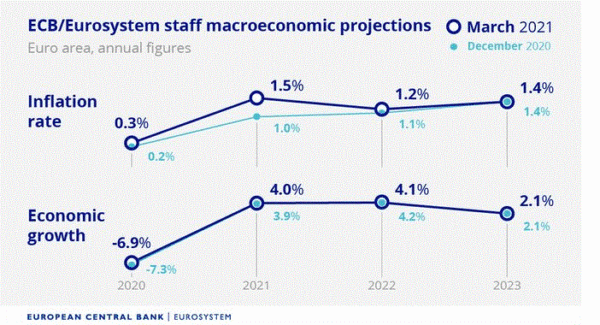While leaving the monetary policy measures unchanged, the ECB indicated that it would increase asset purchases in coming months. The move is a response to the rise of bond yields which could tighten the financial conditions. On economic developments, the central bank attributed the likely contraction in 1Q21 to high coronavirus infection rates, mutations and lockdowns. GDP projections were, however, revised slightly higher amidst expectations that the recovery would pick up more rapidly in the second half. The central bank looked through the recent pickup in inflation, expecting long-term inflation to stay below its target.
As suggested in the accompanying statement, ECB noted that it “expects purchases under the PEPP over the next quarter to be conducted at a significantly higher pace than during the first months of this year”. The statement also indicated that it would “purchase flexibly according to market conditions and with a view to preventing a tightening of financing conditions that is inconsistent with countering the downward impact of the pandemic on the projected path of inflation”. At the press conference, Lagarde raised concerns about higher bond yields, suggesting that it could “translate into a premature tightening for financing in all sectors of the economy”.
Renewed lockdown measures in the first quarter have drag economic recovery, leading to contraction. As President Christine Lagarde suggested, “incoming economic data… point to continued economic weakness in the first quarter of 2021, driven by the persistence of the pandemic and the associated containment measures… As a result, real GDP is likely to contract again in the first quarter of the year”. The central bank acknowledged that inflation has “picked up in recent months”. Yet, it was likely due to “transitory factors and higher energy prices”, with inflation staying below the +2% target.
On the updated economic projections, GDP growth is revised slightly higher to +4% this year, from December’s forecast of +3.9%. Growth would improve slightly further to +4.1% (Dec: +4.2%) in 2022, before decelerating to +2.1% in 2023. On price level, inflation is projected to accelerate to +1.5% this year. This marks a significant upgrade from December’s +1%. This would be followed by moderation to +1.2% and +1.4% in 2022 and 2023 respectively.


 Signal2forex.com - Best Forex robots and signals
Signal2forex.com - Best Forex robots and signals




